'When it is an open ballot, the division taking place in the open house will be for all to see.'
'As they say sunlight is the best disinfectant, this (aspect of the order) brings in transparency and it's in keeping with the best democratic principles.'
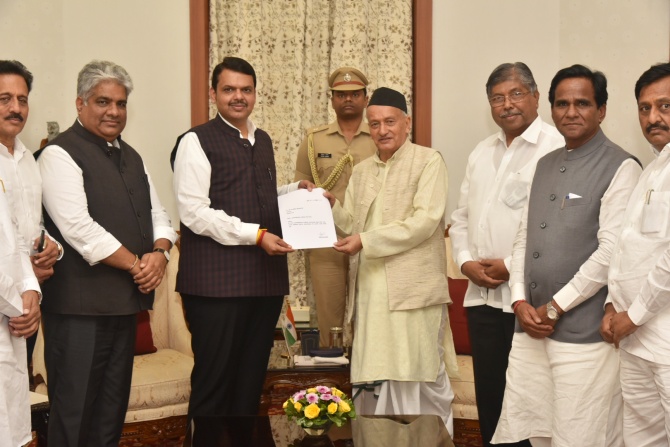
"Now that the Supreme Court has given its order, the pro-tem Speaker has to immediately convene the House, put the matter to vote and make fair declaration of the results," former additional solicitor general and Senior Supreme Court Advocate K V Viswanathan tells Prasanna D Zore/Rediff.com
Coming on Constitution Day, what is the significance of today's Supreme Court ruling?
It is a wonderful judgment in line with the pronouncements that have earlier come in similar legal matters.
Closer home we had the Karnataka matter where again short time was given (to prove the majority on the floor of the house).
Considering that the matter was heard on Sunday and Monday and the order being pronounced on Tuesday is a fair call and keeping with Constitutional principles.
Would you say there was some delay on the part of the Supreme Court to pronounce the order?
I don't think so. On the contrary, they (the three-judge Bench of Justices N V Ramana, Ashok Bhushan and Sanjiv Khanna) sat on Sunday, and the reason why they adjourned it (their decision) to Monday was to peruse the letters (given by Devendra Fadnavis) because, in this case, the Constitutional process of the single largest party (the BJP with 105 MLAs) being called, failing which the next largest party (the Shiv Sena with 56 MLAs) being called, failing which the third party (the NCP with 54 MLAs) being called had taken place.
(After all the three parties failed to form a government) President's rule had been imposed.
The question was whether the swearing in, which happened on Saturday morning (November 23), was correct.
Now, the Supreme Court had to be satisfied that the governor had the material to invite (and administer tbhe oath of office to Devendra Fadnavis and Ajit Pawar) Fadnavis and having perused the letters and found them to its satisfaction the next course open to the Supreme Court was to subject the incumbent government to a floor test, which is what was ordered. The time given is hardly a day from the date of pronouncement.
Under these circumstances it is a fair, balanced and correct order.
How significant is the order which says there should not be a secret ballot and the live telecast of the floor test?
It is very significant because a secret ballot can give room for manipulation.
When it is an open ballot, the division taking place in the open house will be for all to see. As they say sunlight is the best disinfectant, this (aspect of the order) brings in transparency and it's in keeping with the best democratic principles.
The prayer for a secret ballot was also declined in the Karnataka case. By issuing the order to hold the floor test openly, the Supreme Court eliminated any chance of horse trading or cross voting that could have happened had it been a secret ballot.
Is the order to hold a floor test on Wednesday, an adverse one for the Fadnavis government? Would they have preferred more time?
Not at all; not at all. From the day he was sworn in, he must be aware that this (facing the floor test to prove his majority) had to be done. There is no doubt reduction in the time (the Supreme Court ordered completion of the floor test by the evening of November 27 while the governor had given time till November 30).
But looking at the overall scenario, I don't think it is an adverse order. It is an order which upholds democratic principles and by narrowing the time, horse trading from all sides have been eliminated. So, one has to look at it that way.
In case some MLAs cross vote in favour of the government, how will this be handled?
That's a very large issue and an important question that you have raised because what has been happening in the recent past is even if there are complaints of defection, which should lead to disqualification, the ruling combine to which the speaker will normally support, doesn't take up the matter for disposal quickly. He keeps that (whether the legislators who cross-voted should be disqualified or not) lingering on.
Now, that there is a pro-tem speaker, where normally a senior-most member is sworn in, we will have to wait and watch what happens in the event there is cross voting and there are complaints of defection, and how soon it gets adjudicated.
How is a pro-tem speaker normally appointed?
By convention the senior-most member of the House is appointed the pro-tem by the governor in the sense that the member who has been elected the maximum number of times, and who in terms of age and stature commands respect and seniority (among all the elected members).
The situation in the Maharashtra assembly is also unique in the sense that the NCP, which first appointed its leader of the legislature party defected. Then the NCP sacked this leader and elected a new leader of the legislature party. So, there is a question mark over who could legally claim the status?
Could Ajit Pawar have been able to issue a whip to NCP MLA? How legally tenable could that have been?
Now that he has been removed (from the post of leader of the NCP's legislature party) any whip issued by him will be of no consequence.
So, Ajit Pawar's position as leader of the NCP's legislature party w no longer tenable?
Though it may be attempted to be raised the removal was arbitrary and illegal, but since the writing is on the wall at least when the majority of the members (of the NCP) have removed him and elected another leader in his place, Ajit Pawar's whip will have no consequence in my view.
Under what rule could Prime Minister Narendra Modi ask the President of India to revoke President's rule in the early morning on November 23?
News reports talk about Rule 12 related to the Transaction of Business Rules which empower the prime minister to invoke it in case of emergency without getting the Cabinet's approval. But it is highly debatable whether when there is already a Cabinet decision (to impose President's rule) it can be revoked by invoking this rule.
I can understand a new decision being taken by invoking this rule; in a vanilla situation where nothing has happened first time and the rule is invoked when there is a Cabinet decision, and I don't see any emergency, then there is a serious dispute on the invocation of that rule.
I don't think the prime minister has been correctly advised.
Heavens were not going to fall if we had waited for an approval from the Cabinet being taken by circulation, or a Cabinet meeting being called at nine o'clock in the morning.
I would put it this way: The prime minister ought to have been better advised.
So could this recommendation by the prime minister voluntarily without consulting the Union Cabinet be considered improper or unconstitutional?
Today, that is irrelevant because nobody wants President's rule to prevail for a long duration; the idea of President's rule and keeping the assembly in suspended animation is to enable the formation of the government.
So I would look at the prime minister's action, without there being any contrary material, to be a step in aid for the formation of the government.
That issue has now become irrelevant, though I would think in future great caution should be exercised before invoking that rule.
What are the checks and balances built in the Constitution against the misuse of Constitutional powers conferred upon the prime minister by Rule 12 of Government of India rules on transaction of business?
Rule 12 is an exception; exception is when the rule is otherwise. The rule is: Go to the Cabinet (if you want to revoke a Cabinet decision); exception is in an extremely emergency situation.
If there is gas leak of enormous proportion and some decision has to be taken quickly; there is a flood which has happened; there is a tsunami; there is something which cannot wait till daybreak.
Are there any Constitutional checks and balances against such arbitrary use of Rule 12?
There is. An order of revocation or an invocation of emergency power can always be subjected to judicial review.
But even the Shiv Sena, NCP and Congress, which filed the writ petition did not press or argue on setting aside of the revocation order and reinstating President's rule.
There is no bar to put that (decision of the prime minister to revoke President's rule without consulting the Union cabinet) to judicial review.
How important would be the role of the pro-tem speaker when the House convenes for the floor test and oath of secrecy is administered to the elected legislators?
Extremely important! He (the pro-tem speaker) is now the leader of the House; he has to maintain the dignity and decorum of the House. The House is plenary in its own right. It is a great institution, the legislature.
The Supreme Court by its order has shown respect and has acted in furtherance of Article 51 A, which is, there should be mutual respect for institutions.
Now that the Supreme Court has given its order, the pro-tem Speaker has to immediately convene the House, put the matter to vote and make fair declaration of the results.
Any attempt at coming into the well and creating pandemonium etc should be anticipated and thwarted so that the order of the Supreme Court is immediately implemented.
What are the chances that the pro-tem Speaker could misuse this powers vested in him by the Constitution?
I still belong to the old school which would presume that now that the court has directed, and as we saw there was no problem in Karnataka before the matter was put to vote.
Here, we don't know what is going to happen. The vote may happen. The government may survive or fall, but I don't think now that the Supreme Court has ordered there will be any attempt to defeat or frustrate that order.
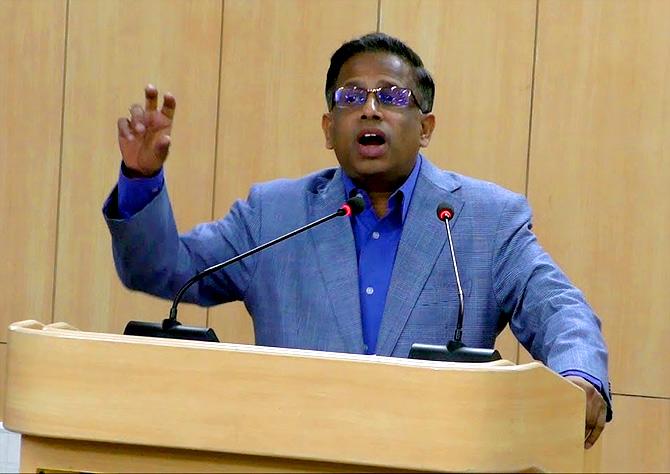 IMAGE: K V Vishwanathan.
IMAGE: K V Vishwanathan.How lawfully tenable is Ajit Pawar's position?
Even if he has to say that his removal is illegal he has to vindicate himself and prove it. He cannot assume that it is a void order of removal and act on that basis. And he has not moved the court against his removal.
Can Ajit Pawar still issue a whip which the NCP MLAs will have to follow for the fear of disqualification given Ajit Pawar's contention that the power given to the chief whip still rests with him?
Even if a dispute of that nature is created, that whip will be of no effect. And the members (of the NCP) ignoring that (whip) and following the whip of the current incumbent legislature party leader (Jayant Patil of the NCP), which they have democratically elected, will alone prevail.
In case the Fadnavis government fails to prove its majority in the assembly, can the Centre direct the President to dissolve the assembly or invoke President's rule again?
No. If they fail, the governor will have to explore the letter given by the Shiv Sena, the NCP and Congress combine submitted yesterday (November 25), and be satisfied and give them a chance (to form the next government).
Any attempt to impose it (President's Rule) again will be reviewable under the Bommai Doctrine.
So, there is no Constitutional provision by which the Centre can impose President's rule or dissolve the assembly?
There is, there is a way, but the legitimacy of this exercise can always be questioned under the Bommai parameters. So, I would think that now in this scenario, the revocation having happened at 5.47 am on November 23, on Saturday morning, I would think that the central government will not embark on such a misadventure of imposing President's rule again when there is already a letter with the governor of the Shiv Sena, NCP and Congress claiming to form the next government in case Devendra Fadnavis fails the floor test.
Can the Centre still dissolve the House in case the BJP fails to prove its majority on the floor of the House?
Suppose the next combine also is not able to prove, and there is a deadlock.
So, if the Fadnavis government fails, there is nothing that can stop the SS-NCP-Congress combine to stake a claim to form the government and for the governor to give them a chance to explore such a possibility?
If power is to be abused, it can be. But ordinarily speaking, in accordance with the Constitutional norms, when this government has failed, and there is a letter showing support, he (Governor Bhagat Singh Koshyari) ought to give the next combine a chance.
Not doing it will be abuse of power.
Shouldn't the President of India have objected to the prime minister revoking President's rule without the consent of the Union Cabinet?
We don't know what went on between the President and prime minister. The President has the status of a sage counsel. He is bound by the aid and advice of the council of ministers or when Rule 12 is invoked on the advice of the prime minister. His position is he signs on the dotted line.
But there have been instances where President R Venkatraman, President Rajendra Prasad have given sage counsel (to the prime minister and his executive council).
We don't know whether it (sage counsel) was given (by President Ram Nath Kovind before the prime minister exercised Rule 12 to revoke President's rule). But otherwise, the President is bound by the aid and advice of the council of ministers and in this case by the advice of the prime minister.
So I think we should now not get into the issue of what the President should have done. But there are precedents where Presidents have stepped in and said, look, this is not the appropriate course.
President K R Narayanan stepped in when there was an attempt to impose President's rule in Bihar in 1997. Now that we don't know what went on between the President (Ram Nath Kovind) and the prime minister (Narendra Damodardas Modi), it will be difficult to hazard a guess there.
This interview was conducted shortly before Ajit Pawar and then Devendra Fadnavis resigned as deputy chief minister and chief minister respectively.
Prasanna D Zore covers both national and Maharashtra politics. He can be contacted at prasannaz@rediff.co.in
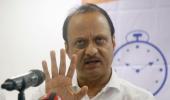
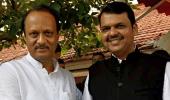
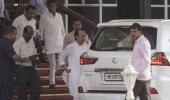
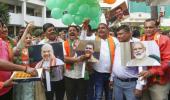







 © 2025
© 2025